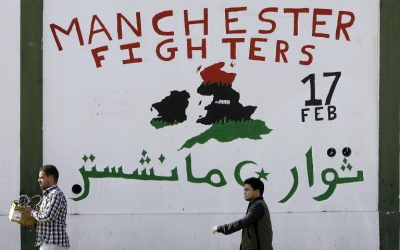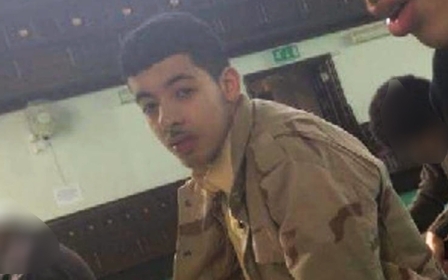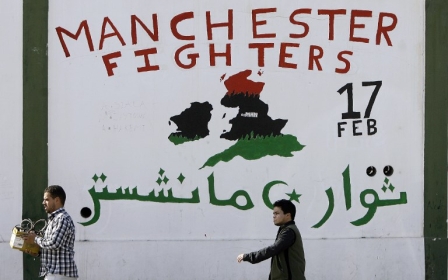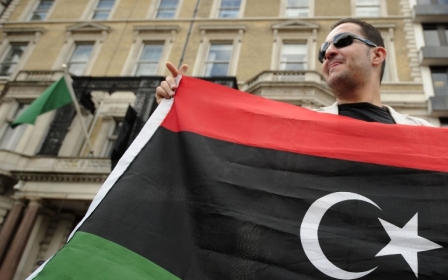Manchester bomber 'probably' fought in Libya, inquiry hears
A British-Libyan man who carried out a deadly bombing at the Manchester Arena in 2017 “probably” fought with opposition forces during Libya's 2011 civil war, an inquiry into the attack heard on Thursday.
Giving evidence to the inquiry, Abdalraouf Abdallah, a British-Libyan former fighter from Manchester, said Salman Abedi may have fought in the conflict, having "helped in other ways".
Abedi was 22 when he killed 22 other people and himself in an attack on crowds leaving an Ariana Grande concert at the music venue on 22 May 2017.
The inquiry has heard that he travelled to Libya in 2011, aged 16, during the uprising that resulted in the toppling and killing of long-time Libyan leader Muammar Gaddafi.
The inquiry this week saw photos of Salman Abedi in Libya in 2011 holding a heavy machine gun and dressed in combat fatigues. It also saw photos of his father, Ramadan Abedi, and brothers, Ismail and Hashem Abedi, posing with weapons.
New MEE newsletter: Jerusalem Dispatch
Sign up to get the latest insights and analysis on Israel-Palestine, alongside Turkey Unpacked and other MEE newsletters
Hashem Abedi was jailed for 55 years earlier this year after being convicted of helping to plan the attack.
Ramadan Abedi, who is currently in Libya, is reportedly a suspect in the case but has not been charged with any offence. Ismail Abedi left the UK in August after being summoned to give evidence to the inquiry.
Abdallah, 28, suffered injuries during the conflict which have left him paralysed. In 2016 he was jailed for terrorism offences after being convicted of helping people travel to Syria to fight and of trying to send money to his brother who had travelled to Syria to join the Islamic State (IS) group in 2014.
He told the inquiry he had travelled to Libya in 201o to visit family during a gap year from college. He joined demonstrations against Gaddafi in Tripoli in February 2011 where he said he saw crowds were "sprayed with bullets" by security forces.
"They were using anti−aircraft against human beings and that was happening and that’s what I was seeing," he said.
As the conflift escalated, Abdallah said he joined an anti-Gaddafi armed group named the Tripoli Brigade, which he said was part of a wider anti-Gaddafi force, the 17 February Martyrs Brigade.
Abdallah said other young British-Libyans from Manchester had also travelled to the country to fight, and that Ramadan Abedi was part of the same group.
Asked whether Ramadan Abedi had fought, he said: "I know that he was helping. That’s all I know."
Abdallah said he was "trained by Nato" when he first joined the group, and later worked as a translator on the front line alongside other foreign fighters.
He said the group mostly consisted of civilians who felt forced to fight against Gaddafi.
"We were forced to, as we were backed up by the whole world and we were fighting and NATO fighting actually with us, or alongside with us, as the British Government also."
Asked by Pete Weatherby, counsel for the families of the victims of the bombing, whether he had seen Salman Abedi fighting, Abdallah said Abedi had "helped in other ways at that time".
He added: "I've not seen him in the front line fighting, but probably he did fight."
'Open door' policy
Middle East Eye reported in 2017 that the British government had operated an “open door” policy that allowed Libyan exiles and British-Libyans to travel to Libya to join the revolution against Gaddafi.
Former fighters told MEE they were able to travel to Libya with "no questions asked" at the time of the conflict, even though some were subject to counter-terrorism control orders restricting their movement.
A number of them were associated with the Libyan Islamic Fighting Group (LIFG), an anti-Gaddafi Islamist militant group formed in 1990 by Libyan veterans of the fight against the Soviet Union in Afghanistan.
The LIFG was listed as a proscribed terrorist organisation in 2005 at a time when the British government was building closer ties with Gaddafi and had reportedly been involved in the abduction and rendition to Tripoli of two LIFG leaders, Abdel Hakim Belhaj and Sami al-Saadi.
On Monday, Alzoubare Mohammed, a friend of Salman Abedi, told the inquiry that the British government had allowed members of the Libyan community in Manchester to go to Libya to fight Gaddafi.
The UK was at the time part of a Nato-led coalition supporting anti-Gaddafi rebels, imposing a no-fly zone over the country. Gaddafi was killed by opposition fighters in October 2011 after a convoy in which he was travelling was hit by an air strike.
The inquiry is currently covering the "background and radicalisation" of Salman Abedi following three weeks of closed hearings in which the Security Service, MI5, and counter-terrorism police gave evidence in secret.
Abdallah was visited by Salman Abedi in prison in the months before the 2017 bombing, and the pair also exchanged phone calls and messages. He denied any knowledge of Abedi's plans.
He said he had known Abedi and his brothers since their childhoods and was "part of his circle".
In 2014, the pair exchanged messages containing, Weatherby said, "repeated references there to a good death and martydom".
Abdallah replied: "There are a lot of messages talking about an end because of what's going on in our countries every day. My friends were dying in Libya and Syria."
Asked earlier by Paul Greaney, counsel to the inquiry, whether he had played any part in the "radicalisation of Salman Abedi or his extreme world view", he replied: "Not at all."
The inquiry continues.
Middle East Eye delivers independent and unrivalled coverage and analysis of the Middle East, North Africa and beyond. To learn more about republishing this content and the associated fees, please fill out this form. More about MEE can be found here.





